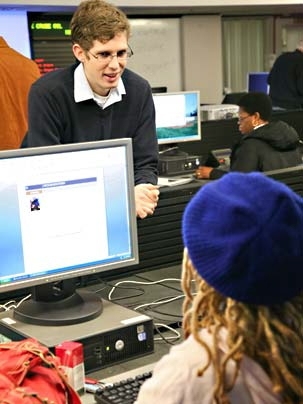Even though close to half of all Americans have broadband access in their home, the digital divide — the gap between those who have access to information technologies and those who do not — continues to grow both at home and abroad.
A group of MIT volunteers hopes to close that gap through CommuniTech, a program that started in 2000 by focusing on refurbishing older donated computers and giving them to economically disadvantaged people in the area. Since its inception, however, it has broadened its goals to teach the recipients of its computers how to use the technology comfortably.
Today, CommuniTech has two branches: The Used Computer Factory (UCF), coordinated by CSAIL staff member Jason Dorfman, refurbishes donated computers. Families Accessing Computer Technology (FACT), coordinated by MIT senior Ian J. Sugel, handles the client-training side.
Each year since 2000, More than 20 MIT community members have donated their time to the program.
UCF: The Fix-IT Factory
CommuniTech is always looking for donations of Pentium IV machines or better. (Macs are currently not part of the program.) Flat-screen LCD monitors in full working order are also very much needed.
If you have a computer you’d like to donate, begin by filling out the form at imara.csail.mit.edu. If your department has older computers available for donation, contact MIT’s Property Manager, Michael McCarthy, so that he can deactivate the computers and keep a record of the donation. You can reach him at mmccarth@mit.edu or 617-253-2779.
UCF has placed more than 240 computers in local homes since 2000. It's a win-win situation: the new owners benefit and the computers get reused rather than recycled.
FACT gives back
The FACT course covers hardware basics and word processing, spreadsheet, web browser and e-mail applications. Each volunteer is matched with a client and works with him or her for two hours on Saturday mornings over six weeks.
Sugel relishes making a difference in the local community: "Growing up in the age of the computer, most of us take its use for granted, but access to a computer changes someone's life forever. It's about giving people the freedom to explore the world in ways that they had never thought possible."
Get involved
Anyone at MIT is welcome to help with UCF or FACT. Both programs have training sessions for volunteers at the start of each semester. Volunteers also meet periodically to discuss their experiences and issues concerning the Digital Divide.
CSAIL staff member Jason Dorfman volunteers his time to run CommuniTech and raise funds for the program. To get in touch with CommuniTech, send mail to communitech-staff@mit.edu or call 617-324-9135.
IMARA, the organization in CSAIL that sponsors CommuniTech, strives to empower underserved communities through sustainable technology and education. (Imara means “power” in Swahili.) IMARA also sponsors projects in the Fijian Islands, Kenya, the Middle East and Navajo communities in the U.S. Southwest.
To learn more about IMARA and its outreach efforts, including CommuniTech, visit imara.csail.mit.edu.
A version of this article appeared in MIT Tech Talk on June 4, 2008 (download PDF).
A group of MIT volunteers hopes to close that gap through CommuniTech, a program that started in 2000 by focusing on refurbishing older donated computers and giving them to economically disadvantaged people in the area. Since its inception, however, it has broadened its goals to teach the recipients of its computers how to use the technology comfortably.
Today, CommuniTech has two branches: The Used Computer Factory (UCF), coordinated by CSAIL staff member Jason Dorfman, refurbishes donated computers. Families Accessing Computer Technology (FACT), coordinated by MIT senior Ian J. Sugel, handles the client-training side.
Each year since 2000, More than 20 MIT community members have donated their time to the program.
UCF: The Fix-IT Factory
CommuniTech is always looking for donations of Pentium IV machines or better. (Macs are currently not part of the program.) Flat-screen LCD monitors in full working order are also very much needed.
If you have a computer you’d like to donate, begin by filling out the form at imara.csail.mit.edu. If your department has older computers available for donation, contact MIT’s Property Manager, Michael McCarthy, so that he can deactivate the computers and keep a record of the donation. You can reach him at mmccarth@mit.edu or 617-253-2779.
UCF has placed more than 240 computers in local homes since 2000. It's a win-win situation: the new owners benefit and the computers get reused rather than recycled.
FACT gives back
The FACT course covers hardware basics and word processing, spreadsheet, web browser and e-mail applications. Each volunteer is matched with a client and works with him or her for two hours on Saturday mornings over six weeks.
Sugel relishes making a difference in the local community: "Growing up in the age of the computer, most of us take its use for granted, but access to a computer changes someone's life forever. It's about giving people the freedom to explore the world in ways that they had never thought possible."
Get involved
Anyone at MIT is welcome to help with UCF or FACT. Both programs have training sessions for volunteers at the start of each semester. Volunteers also meet periodically to discuss their experiences and issues concerning the Digital Divide.
CSAIL staff member Jason Dorfman volunteers his time to run CommuniTech and raise funds for the program. To get in touch with CommuniTech, send mail to communitech-staff@mit.edu or call 617-324-9135.
IMARA, the organization in CSAIL that sponsors CommuniTech, strives to empower underserved communities through sustainable technology and education. (Imara means “power” in Swahili.) IMARA also sponsors projects in the Fijian Islands, Kenya, the Middle East and Navajo communities in the U.S. Southwest.
To learn more about IMARA and its outreach efforts, including CommuniTech, visit imara.csail.mit.edu.
A version of this article appeared in MIT Tech Talk on June 4, 2008 (download PDF).






